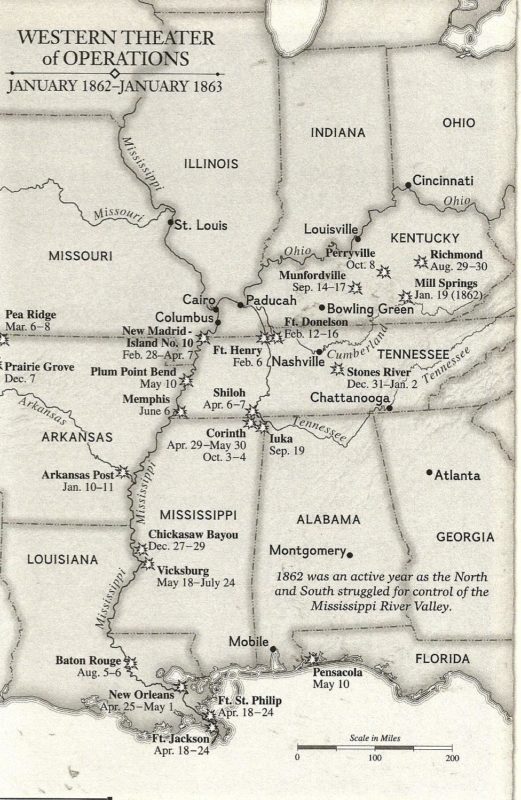War in the West #4 The River War
War in the West: The Opening Attack
The second target in the Grant/Foote attack plan was Fort Donelson. As you can see from the map, this fort was a short march to the East from Fort Henry for Grant’s force of about 15,000 men. Captain Foote moved his fleet from the Tennessee to the Cumberland River in order to play his part in the attack.
This time, however his fleet would not command the battle. The guns of Fort Donelson did serious damage to his flotilla. The capture of this fort would therefore be a job for the army. Grant was not able to head his force in that direction until Feb. 12, 1862. By this time his army had grown to 25,000 men. Besides strength of numbers, Grant had another advantage. The Confederate defenders were led by two political appointees of CSA President Davis: Generals Pillow and Floyd. Neither man had any military experience.
Even with this weak leadership, Fort Donelson would be more difficult to capture than Fort Henry. It had a strong position on the Cumberland River, extensive armament and almost 15,000 defenders. Never-the-less, Grant intended to move against the fort as soon as all his troops were in position.

On February 14th, Captain Foote sailed his fleet of ironclads and timber clad vessels withing 350 yards of the fort. Moving on swift water and well below the plunging fire of its guns, Foote’s ships suffered such serious damage that all of them had to be withdrawn. In fact, Foote’s ship the St. Louis was hit so badly that it had to be withdrawn from the fight and seek repairs.
Meanwhile, Grant’s force began to dig in, surrounding the fort.
Before he could complete his arrangements, however, CSA General Floyd ordered an attack against the weakest part of Grant’s position. This attack was designed to forge an escape route away from Donelson and a path toward Nashville for the surrounded army. After what has been described as fierce fighting, the Confederates were successful. But instead of taking advantage of the opening, thus saving the Confederate army, CSA General Pillow suddenly, and without explanation, ordered a withdrawal to the safety of the fort instead.
Grant moved quickly to close the opening in his lines and ordered a general attack of his own. As a result, the original lines were re-established. Generals Floyd and Pillow then decided to flee and to surrender their army and the fort to Grant. They left General Buckner in charge with orders to stay and handle the surrender. Col. Nathan Bedford Forrest refused to surrender and escaped to Nashville with is cavalry.
When General Buckner asked for terms, Grand replied, “No terms except unconditional and immediate surrender can be accepted. I propose to move immediately upon your works.” Buckner had no choice, he agreed to surrender his command and the fort to Grant. So, on February 16th, 1862 the two men met at the Dover Hotel to formalize the surrender.
The cost of the surrender and the effect it had on the Confederacy was profound:
- An entire army of almost 15,000 soldiers was taken prisoner and sent to Federal prisons in the North. (This was the largest number of prisoners taken up to that point in the war.)
- Both the Tennessee and the Cumberland Rivers came under Union control and were therefore open to Northern traffic once again.
- Nashville, the capital of Tennessee, a vital manufacturing and rail center had to be abandoned by Confederate forces on February 23 rd and was occupied by Federal troops on February 24th.
- Columbus, KY and the Confederate fort there dominating the Mississippi River had to be abandoned.
- By capturing Forts Henry and Donelson, Confederate General Albert Sidney Johnston had to move his forces out of Kentucky, abandon Nashville and move his defensive line south to Corinth, Mississippi. Thus Grant’s victory had forced the Confederates to give up all hope of controlling Kentucky as well as virtually all of Middle and Western Tennessee.
Confederate General Albert Sidney Johnston said the loss was, ‘disastrous and almost without remedy.”
The Northern press hailed this first Northern victory of the war and dubbed Grant, “Unconditional Surrender Grant.” He became an overnight hero in the North.


 A Great Read! I couldn’t put this book down once I got started. The detail was great and I really like the main character, Michael. Knowing that so much research went into this book made it exciting to read!
A Great Read! I couldn’t put this book down once I got started. The detail was great and I really like the main character, Michael. Knowing that so much research went into this book made it exciting to read!